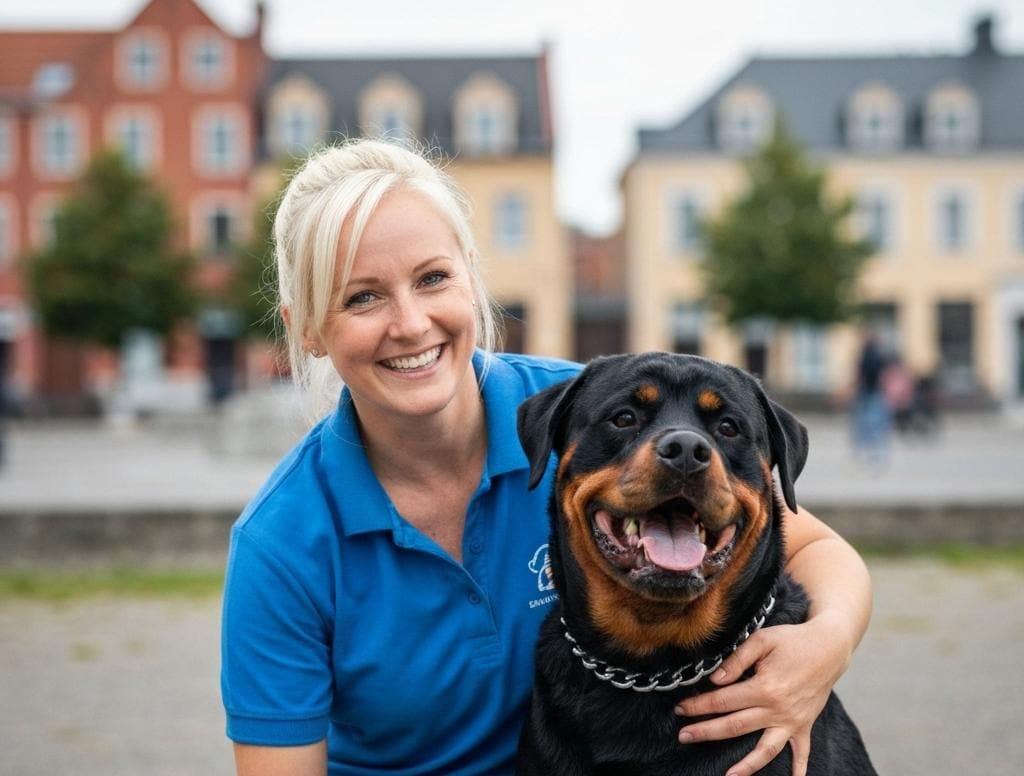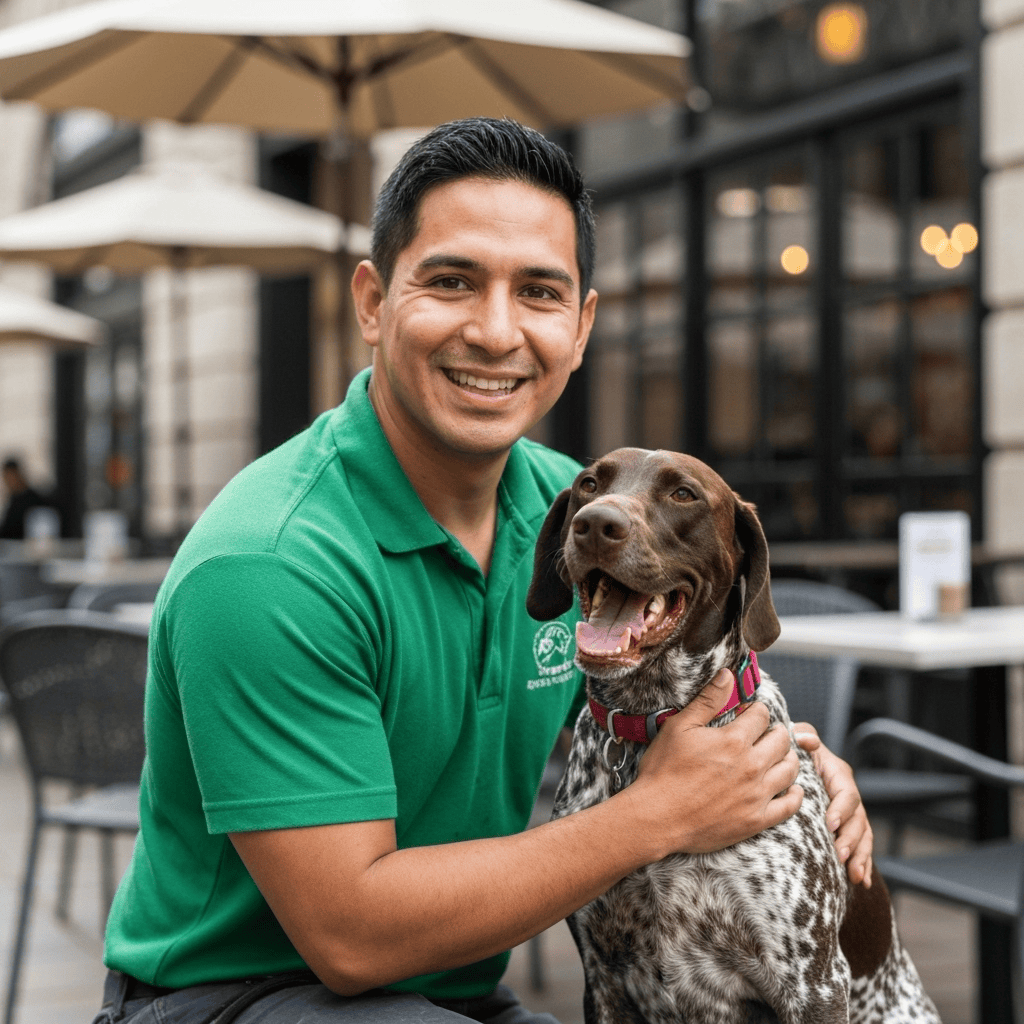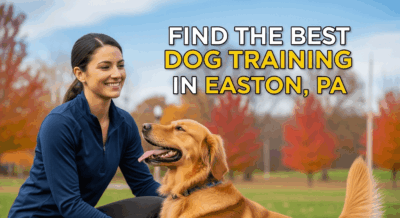Your Complete Guide to Choosing a Dog Trainer in Easton
When you’re walking your dog through downtown Easton or along the Delaware River, you quickly realize how much good training matters. Between the bustling activity near Centre Square, joggers on the Karl Stirner Arts Trail, and weekend crowds at Riverside Park, your dog faces plenty of distractions every day.
That’s where the right trainer comes in. A good local trainer understands what it’s like to live with a dog in Easton and can help you both navigate everything from busy sidewalks to community events with confidence.
Finding the Right Trainer for Your Dog
The best trainers in the Easton area use positive reinforcement methods and understand the unique challenges of city living. They’ll work with you on real-world skills, not just commands in a sterile classroom setting.
Start by thinking about what you actually need help with. Maybe your puppy needs to learn basic manners before exploring downtown, or perhaps your rescue dog gets overwhelmed by the activity along the riverfront. Some dogs need help with leash pulling, while others struggle with separation anxiety when left alone in apartments.
Look for someone who’s worked with dogs facing similar challenges. A trainer who specializes in puppy socialization might not be the best fit for a reactive adult dog, and vice versa. Many Easton families find that starting with in-home training helps establish good habits at home before venturing out into busier areas.
While Pennsylvania doesn’t require trainers to be licensed, certifications show that someone has invested in their education. You’ll often see credentials like CPDT-KA, KPA-CTP, or CBCC-KA. These aren’t just alphabet soup – they represent hundreds of hours of study and hands-on experience.
A quality trainer will explain their approach clearly and outline realistic goals for your specific situation. They should also know good spots around Easton to practice skills as your dog progresses.
Understanding Different Training Approaches

Positive reinforcement training forms the foundation of modern dog training, and for good reason. Instead of focusing on what your dog does wrong, this approach rewards the behaviors you want to see more of. Dogs learn faster and retain skills better when training feels rewarding rather than stressful.
This method works particularly well in Easton’s urban environment. When your dog sees a squirrel near the Cataract Dam but chooses to focus on you instead, that’s worth celebrating. Over time, these positive experiences build the kind of reliable response you need when walking through busy areas.
For dogs dealing with fear, anxiety, or reactivity, trainers often use specialized behavior modification techniques. These approaches help change how your dog feels about triggers, not just how they respond to them. If your dog gets nervous around the crowds at Farmers Markets or tenses up when bicycles pass on the trail, this type of work can make a real difference.
Puppy training focuses heavily on prevention and socialization. The goal is helping young dogs develop confidence and good habits before problems start. This might include getting comfortable with city sounds, meeting different types of people, and learning to settle calmly in busy environments.
You’ll also need to decide between group classes and private training. Group settings provide built-in distractions and socialization opportunities, while private sessions allow for more customized attention. Some trainers offer day training programs where they work with your dog during the day, then teach you how to maintain the skills at home.
What Training Costs in the Easton Area
Training prices in Northampton County vary based on the trainer’s experience, the type of program, and how much travel is involved. More experienced trainers and those with specialized certifications typically charge higher rates.
| Service Type | Local Price Range | What’s Usually Included |
|---|---|---|
| Group classes (4-6 weeks) | $150 – $250 | Weekly sessions, basic supplies list, homework assignments |
| Private lessons (60-90 min) | $100 – $160 | Customized plan, practice in your environment, written notes |
| Puppy packages (4-6 lessons) | $350 – $600 | House training, socialization plan, basic manners |
| Behavior consultation | $120 – $200 | Problem assessment, safety planning, training roadmap |
| Day training (per week) | $450 – $800 | Daily sessions with your dog, weekly owner coaching |
| Board and train (2-4 weeks) | $1,800 – $3,800 | Intensive training, transfer sessions, follow-up support |
Many trainers offer a brief phone consultation to discuss your needs and determine if they’re a good fit. This can save both of you time and help you make a more informed decision.
When comparing prices, pay attention to what’s actually included. Some trainers provide extensive follow-up support, while others charge extra for additional help between sessions.
Important Questions to Ask Before You Hire
Before committing to any trainer, you’ll want to understand their approach and how they’ll work with your specific situation. Here are the key questions that will help you make the right choice:
- What training methods do you use, and how do you handle situations when dogs get stressed or confused?
- What education, certifications, or ongoing training do you pursue to stay current in the field?
- How will you customize your approach for my dog’s personality and my family’s lifestyle?
- Where do you like to practice real-world skills around Easton, and how do you decide when a dog is ready for more challenging environments?
- What services do you offer, and which would you recommend for our specific goals?
- What are your rates, travel fees, and policies for cancellations or additional support?
- Do you carry liability insurance, and can you provide proof if needed?
- For behavior issues, do you work with veterinarians when medical factors might be involved?
- How will you teach me to maintain the training so these skills stick long-term?
Pay attention to how they answer these questions. Good trainers will be happy to explain their methods and should never make you feel rushed or pressured into a decision.
Local Laws Every Easton Dog Owner Should Know
Living in Northampton County means following both state and local regulations that affect daily life with your dog. Understanding these rules helps you stay out of trouble and keeps everyone safe.
Pennsylvania’s Dog Law requires dogs to be under control when off their owner’s property. In practical terms, this means having solid leash skills is essential for walks through downtown Easton or along the riverfront trails. You can find complete details on the Pennsylvania Department of Agriculture’s website: Dog Law.
All dogs over three months old need current licenses, which you can purchase online through PA Dog License. This system covers Northampton County and makes renewal simple each year.
Rabies vaccination is required statewide, and your vet can advise you on other vaccines that make sense based on where you spend time with your dog. The PA Department of Health provides rabies information at Rabies.
Easton also enforces standard courtesy rules like cleaning up after your dog and preventing excessive barking that disturbs neighbors. If you live in an apartment or townhouse, addressing separation anxiety and alert barking becomes especially important.
Professional trainers who use public spaces for classes may need permits depending on the location and frequency. This is worth asking about if you’re considering group training in parks.
Great Local Spots for Training Practice
Once your dog masters basics at home, these locations offer perfect opportunities to practice real-world skills in controlled environments.
For off-leash play and socialization, you’ll need to travel slightly outside Easton proper. Monocacy Dog Park in Bethlehem, Nazareth Borough Park Dog Park, and Allen Township Dog Park all provide fenced areas where dogs can interact safely.
The Karl Stirner Arts Trail offers an excellent environment for leash training and practicing focus around mild distractions. You’ll encounter joggers, cyclists, and other dog walkers – perfect for teaching your dog to stay calm and attentive. Find trail information at Karl Stirner Arts Trail.
Hugh Moore Park provides quieter walking paths along the canal where you can work on longer-distance heeling and teaching your dog to settle calmly near water. Park details are available at Hugh Moore Park.
Sections of the Delaware & Lehigh Trail near Easton offer opportunities for longer training walks with steady but manageable distractions. You can learn more about the trail system at D&L Trail.
For dogs who need to build confidence around nature sounds and wildlife, Jacobsburg Environmental Education Center provides wooded trails where you can practice recall and impulse control. Visit PA DCNR for current trail conditions and rules.

Common Questions About Dog Training in Easton
How much does in-home dog training cost in Easton?
Most local trainers charge between $100 and $160 for individual sessions lasting 60 to 90 minutes. Many offer package deals that reduce the per-session cost when you book multiple lessons upfront.
Is in-home dog training worth the investment?
In-home training makes sense when you’re dealing with behavior issues that happen at home, like door manners, jumping on guests, or house training problems. It’s also convenient for busy families and allows the trainer to see exactly what’s happening in your environment.
Can I hire someone to house train my dog?
A trainer can set up an effective house training system and troubleshoot common problems, but you’ll still need to follow through with the daily routine. Consistency from all family members is what makes house training successful.
What is the 3-3-3 rule for dogs?
This guideline suggests that newly adopted dogs need about 3 days to decompress, 3 weeks to start learning your routine, and 3 months to feel truly settled. Training should be patient and structured during this adjustment period, especially for rescue dogs.
How long will it take to see results from training?
Basic obedience skills typically take 4 to 8 weeks of consistent practice to become reliable. Behavior modification for issues like reactivity or anxiety often requires several months of gradual work, with progress happening in small steps rather than dramatic breakthroughs.
What should I bring to my first group class?
Pack a well-fitted collar or harness, a standard 6-foot leash, high-value treats cut into small pieces, water for your dog, waste bags, and any vaccination records the facility requires. Leave retractable leashes at home – they don’t provide enough control in group settings.
What are Easton’s leash laws?
Pennsylvania law requires dogs to be under control off their owner’s property, and Easton enforces local leash ordinances in public areas. Reliable leash skills and recall training become essential for safely enjoying the city’s parks and trails.
Do I need to license my dog in Northampton County?
Yes, Pennsylvania requires annual licensing for all dogs over three months old. The online system at PA Dog License handles renewals for the entire state, including Northampton County.
What vaccinations does my dog need in Pennsylvania?
Rabies vaccination is required by state law. Your veterinarian can recommend additional vaccines based on your dog’s age, health status, and lifestyle factors like visiting dog parks or boarding facilities.
Do dog trainers need special licenses in Pennsylvania?
The state doesn’t require specific licensing for dog trainers. Look for professionals with relevant certifications, clear training methods, liability insurance, and good references from other local dog owners.
Where can I practice off-leash recall safely?
The fenced dog parks mentioned above provide secure environments for off-leash training. Always master recall on a long training leash before attempting off-leash work, even in fenced areas.
Which local parks allow dog training?
Most public trails and parks welcome leashed dogs, but check posted rules before starting training sessions. The dog parks in Bethlehem, Nazareth, and Allen Township specifically accommodate training activities as long as you’re respectful of other users.
Are there dog-friendly beaches or waterfront areas for training?
While Easton doesn’t have designated dog beaches, leashed dogs can enjoy waterfront areas like Hugh Moore Park along the canal. The various trail systems provide plenty of opportunities for training near water features.
Do professional trainers need insurance to work in Easton?
Pennsylvania doesn’t mandate insurance specifically for dog training, but reputable professionals carry general liability coverage. Many venues require proof of insurance before allowing group classes on their property.
Finding the right trainer in Easton means looking for someone who understands both effective training methods and the realities of city life with dogs. When you find that combination, you’ll have the support you need to help your dog become a confident, well-mannered companion who can handle everything from quiet neighborhood walks to busy community events.
The time you invest in training pays dividends every day – in less stressful walks, better behavior at home, and the confidence to explore everything the Easton area has to offer with your four-legged friend.
